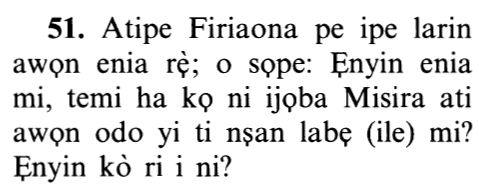43vs51
Select any filter and click on Go! to see results
وَنَادَى فِرْعَوْنُ فِي قَوْمِهِ قَالَ يَا قَوْمِ أَلَيْسَ لِي مُلْكُ مِصْرَ وَهَذِهِ الْأَنْهَارُ تَجْرِي مِن تَحْتِي أَفَلَا تُبْصِرُونَ
Wanada firAAawnu fee qawmihi qala ya qawmi alaysa lee mulku misra wahathihi alanharu tajree min tahtee afala tubsiroona
Index Terms
Click to play
Yoruba Translation

Hausa Translation
Kuma Fir´auna ya yi kira a cikin mutãnensa, ya ce: "Ya mutãnħna! Ashe mulkin Masar bã a gare ni yake ba, kuma waɗannan kõguna sunã gudãna daga ƙarƙashĩna? Ashe, ba ku gani ba?"
Asbabu n-Nuzuul (Occasions of Revelation)
Fir`awn's Address to His People and how Allah punished Him
Allah informs that;
وَنَادَى فِرْعَوْنُ فِي قَوْمِهِ قَالَ يَا قَوْمِ ...
And Fir`awn proclaimed among his people (saying): "O my people!
Allah tells us how Fir`awn stubbornly persisted in his rebellion and disbelief. He assembled his people and addressed them in a vainglorious fashion, boasting of his dominion over Egypt.
... أَلَيْسَ لِي مُلْكُ مِصْرَ وَهَذِهِ الْأَنْهَارُ تَجْرِي مِن تَحْتِي ...
Is not mine the dominion of Egypt, and these rivers flowing underneath me?
Qatadah said, "They had gardens and rivers of flowing water.''
... أَفَلَا تُبْصِرُونَ ﴿٥١﴾
See you not then?
means, `do you not see my position of might and power' -- implying that Musa and his followers were poor and weak.
This is like the Ayah:
فَحَشَرَ فَنَادَى
فَقَالَ أَنَاْ رَبُّكُمُ الاٌّعْلَى
فَأَخَذَهُ اللَّهُ نَكَالَ الاٌّخِرَةِ وَالاٍّوْلَى
Then he gathered (his people) and cried aloud, saying: "I am your lord, most high.''
So Allah seized him with punishment for his last and first transgression. (79:23-25)
يقول تعالى مخبرا عن فرعون وتمرده وعتوه وكفره وعناده أنه جمع قومه فنادى فيهم متبجحا مفتخرا بملك مصر وتصرفه فيها " أليس لي ملك مصر وهذه الأنهار تجري من تحتي " قال قتادة قد كانت لهم جنات وأنهار ماء " أفلا تبصرون " أي أفلا ترون ما أنا فيه من العظمة والملك يعني وموسى وأتباعه فقراء ضعفاء وهذا كقوله تعالى" فحشر فنادى فقال أنا ربكم الأعلى فأخذه الله نكال الآخرة والأولى " .
"ونادى فرعون" افتخارا "في قومه قال يا قوم أليس لي ملك مصر وهذه الأنهار" من النيل "تجري من تحتي" أي تحت قصوري "أفلا تبصرون" عظمتي
قيل : لما رأى تلك الآيات خاف ميل القوم إليه فجمع قومه فقال : فنادى بمعنى قال ; قاله أبو مالك . فيجوز أن يكون عنده عظماء القبط فرفع صوته بذلك فيما بينهم ثم ينشر عنه في جموع القبط ; وكأنه نودي بينهم . وقيل : إنه أمر من ينادي في قومه ; قاله ابن جريج .
I'raab - grammatical analysis of the Qur'an
«وَنادى » الواو حرف استئناف وماض «فِرْعَوْنُ» فاعله والجملة استئنافية لا محل لها «فِي قَوْمِهِ» متعلقان بالفعل «قالَ» ماض فاعله مستتر وجملة قال تفسيرية «يا قَوْمِ» منادى مضاف إلى ياء المتكلم المحذوفة وجملة النداء مقول القول «أَلَيْسَ» الهمزة حرف استفهام وماض ناقص «لِي» جار ومجرور خبره المقدم «مُلْكُ» اسمه المؤخر «مِصْرَ» مضاف إليه مجرور بالفتحة لأنه ممنوع من الصرف «وَهذِهِ» الواو حالية ومبتدأ «الْأَنْهارُ» بدل «تَجْرِي» مضارع فاعله مستتر والجملة خبر المبتدأ والجملة الاسمية حالية «مِنْ تَحْتِي»
متعلقان بالفعل «أَفَلا» الهمزة حرف استفهام والفاء استئنافية ولا نافية «تُبْصِرُونَ» مضارع مرفوع والواو فاعله والجملة مستأنفة لا محل لها.
